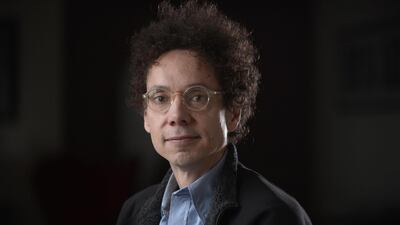Malcolm Gladwell has made such a career of defining complex ideas so succinctly, his bestselling book titles alone have become buzzwords, celebrated way beyond the Ted Talks circuit that laps up his every word. The Tipping Point (2000) brilliantly explored how small trends, products and behaviours suddenly spread "like viruses". In a turn-of-the-century world, which was just coming to terms with things 'going viral' on the internet it made a lot of sense. Then, in 2008, Outliers not only popularised the 10,000-Hour Rule for success, the term itself became a badge of honour among anyone believing in their own USP. So there's always some excitement about the area of pop psychology Gladwell will take on next.
Talking to Strangers, his first book in six years, promises to tell us "what we should know about the people we don't know". But it doesn't offer many easy answers. Like all Gladwell books, it is hugely, effortlessly readable. And it layers historical and pop culture examples on so thick – everyone and everything from Hitler through Amanda Knox to Friends – that the reader is forced to yield under the weight of Gladwellian evidence, finally agreeing his thesis (broadly that we are not very good at understanding people we don't know) is indeed correct.
He starts – and ends – the book with the case of Sandra Bland, a young African-American woman who was stopped in a small Texan town by a white police officer in 2015. They had an argument about a cigarette and the officer arrested her. Three days later she killed herself in her cell.
Gladwell has said he could have written the whole book about this lady. And there’s a lot he does cover (although, interestingly, he strips the race element out), down to how using a heavy-handed stop and search policy to stem crime in cities is probably not appropriate for a quiet neighbourhood during the daytime. He writes that the police were “stopping someone who should never have been stopped, drawing conclusions that should never have been drawn”, and that the death of Bland “is what happens when a society does not know how to talk to strangers”.
The basis of the book is Gladwell's current obsession: the Truth-Default Theory. It's not his theory; that distinction goes to psychologist Tim Devine. But the idea is that we're bad at detecting when people are lying as "our operating assumption is that the people we're dealing with are honest". It leads to some uncomfortable passages, as this is probably Gladwell's darkest book to date. He explores how child abusers are able to go unpunished for years, even when there are obvious doubts about their conduct. And it's usually because, he argues, there are not enough doubts to overcome our default to the truth we want to hear.
You might ask how this more trusting view of humanity ties in at all with the Texan police officer arbitrarily a stopping young black woman in the street – and it's a perfectly valid question; this book can often go off on scrappy tangents (there's a really shoehorned-in section about our reliance on facial expressions, which painstakingly picks apart a Friends episode to make its point).
Gladwell’s suggestion is that these days, simply because our trusting nature has been violated, we have decided that we’d rather our leaders and guardians pursue their doubts than dismiss them. Which leads the police officer to lean in to Bland’s car, judge her slightly strange demeanour (which it transpired later was largely attributable to mental health issues) as a pointer towards potential guilt, and arrest her.
What's slightly odd about Talking to Strangers, though, is that there is no defining, take-home idea to ruminate over. Maybe, given this is such a massive subject, that's an impossible goal. But it means that Gladwell ends up batting around banalities in a doomed quest for understanding. He thinks that Bland would not have died in a jail cell had we been more thoughtful as a society. Probably not, but Gladwell doesn't then offer many ideas as a writer about how we might be more thoughtful, beyond saying we require "humility … and a willingness to look beyond the stranger, and take time and place and context into account". Great.
More strangely, Donald Trump isn't mentioned, and given this book is by an American author in a turbulent age where understanding of difference appears to be beyond the president's gumption, that seems like a massive missed opportunity. Gladwell is avowedly apolitical here, but to really make a difference, Talking to Strangers could have done with being a bit more timely – and a bit less eager to be timeless.



